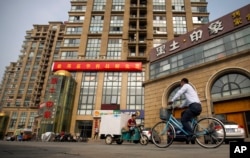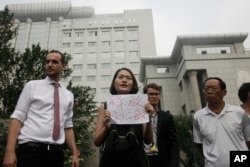China put four human rights defenders on trial last week, each of whom received a prison sentence of three to seven and a half years for state subversion.
But human rights groups and observers say the latest wave of what they call “sham trials” against legal advocates, arrested amid an orchestrated crackdown last July, is mostly a political charade, and to some extent, bears a resemblance to the notorious Moscow Purge trials in the late 1930’s.
More importantly, some added, the trials show that the civil society in China is far from empowered.
Political purge
“History always repeats itself,” rights lawyer Liang Xiaojun said. “This wave of trials reminds us of the Soviet Union’s Moscow trials, where all [defendants] confessed and claimed themselves to be the unpardonable wicked while singing praise to [the union’s leader Joseph] Stalin,” added Liang, who had represented Hu Shiquen in earlier cases.
The Moscow trials of the Soviet Union were generally seen as part of Stalin’s purge of opponents whose guilt was doubted to be genuine.
Hu and three other Chinese activists – Zai Yanming, Zhou Shifeng and Gou Hongguo – stood trial at the Tianjin No. 2 Intermediate People’s Court from Tuesday to Friday. All were sentenced to prison following their trials.
Without examining evidence or defending against the subversion charges, the court sessions were wrapped up in just a few hours, with the convictions based largely on confessions given after the defendants had been held incommunicado for 13 months and deprived of legal counsel of their own choosing.
All four defendants promised not to appeal.
“Today’s trial made me realize my sin. My past action has harmed the party and government. I hereby express my deepest repentance to the government,” Zhou Shifeng told the court on Thursday.
Zhou was director of Beijing’s Fengrui law firm, which was at the center of the government’s crackdown against 300-strong legal defenders after having taken on sensitive cases where its clients challenged the authorities.
Fail to keep heads up
Liang said there is no doubt last week’s subversion trials awarded a political victory to the authorities, who have successfully bent the accused to their will.
An official CCTV editorial described the activists as having conspired to “push down the wall,” or attempted to trigger a “color revolution” to topple the regime, but ended up being pushed down themselves.
Liang admitted that he was frustrated by the outcome of last week’s subversion trials especially after Christian rights lawyer Zhang Kai showed up in court to endorse what he said was problematic legal procedures.
But he said he remains confident other activists to be put on trial in the future will stand firm on their beliefs.
“We wished they [detained defenders] could be set free soon. But we also wished that they would have kept their heads up to plead not guilty. That would have given the [Chinese] civil society a great inspiration and moral motivation,” Liang added.
Civil society empowerment
It’s understandable that the accused might not be free to make up their own mind, especially when the security of their loved ones is at stake, analysts said.
Tseng Chien-yuan, an associate professor at Chung Hua University in Taiwan, argued Chinese society still lacks a strong force to effectively monitor the government’s compliance with legal due process in handling the arrested lawyers and rights defenders.
“Regrettably, in China, where everything is tightly controlled, social forces, which are unbiased and strong enough to challenge or question the way the Communist Party has handled the July 9 crackdown against rights defenders, are not available,” said Tseng.
International human rights groups, including Amnesty International, China Human Rights Lawyers Concern Group (CHRLC) and Chinese Human Rights Defenders, have come forward, calling for Chinese authorities to immediately repeal all four verdicts, end show trials and free the remaining legal defenders.
“Inquiry should be made to hold the Public Security, Procuratorate and the Court at both central and local levels legally accountable for the malfeasances and power abuses incurred in the handling of the cases,” CHRLC said in its press statement.
“The problem is not with the dissent. The problem rather rests in the regime. They feel so paranoid, so frightened of their own people,” said CHRLC chairman Albert Ho, who is also a pro-democracy politician in Hong Kong’s Legislative Council.
According to Ho, Chinese authorities plan to put the remaining detained defenders on trial before the Communist Party’s Politburo meeting in November.






